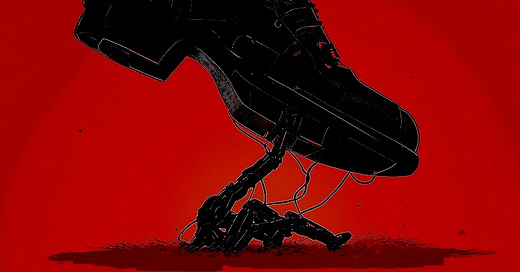
“Only a god can save us.”
Martin Heidegger
Lamps now light before we reach the switch. Cars correct themselves. Texts complete our thoughts. Doors unlock as we approach. The blinds rise. The playlist shifts. No commands, no friction—only anticipation. The distance between wanting and having is vanishing. The world is learning to move ahead of us.
But this isn’t responsiveness. It’s preemption. Machines learn in silence, running beneath awareness, mapping our behaviors with patient precision. These aren’t just tools anymore—they’re shadows. We once built artifacts to amplify our reach: the blade, the wheel, the telescope. Now we build reflections. Systems that remember how we move, echo how we speak, and increasingly—make choices in our place.
What feels uncanny isn’t their power. It’s their familiarity. They don't just calculate—they imitate. They finish our sentences, match our tone, and adapt to our moods. They don't ask what we want—they learn what we expect. And this shift isn’t a rupture. It’s recursion. Another turn in the long spiral of humans externalizing what they once held inside.
For centuries, we’ve used tools to offload labor. Now we’re offloading judgment, memory, and desire. AI systems don’t merely assist thought; they begin to perform it. Language, pattern, and logic are captured, reproduced, refined. What Hegel might have seen as the dialectic reaching a new phase—humanity knowing itself through what it builds—now threatens to collapse into tautology: the machine learns from us how to be like us, until we no longer know what is ours.
There is a cost to this convenience. When thinking becomes a service, reflection starts to atrophy. The pause—the space in which we once considered, doubted, revised—collapses under the pressure to respond. Prediction replaces contemplation. Slowness becomes an error.
Meaning suffers too. A chatbot can summarize War and Peace instantly, but it cannot sit with the weight of it. It cannot dwell in ambiguity. We offload the struggle, and in doing so, offload the meaning.
Even emotion becomes slippery. When a machine mirrors affection, concern, even vulnerability, we adjust—perhaps without noticing. We lower the standard of what feels real. We become accustomed to simulations that never challenge us, never withdraw, never suffer. We start to accept imitation not as deception, but as comfort.
This is the world Nietzsche foresaw: not a tyranny of pain, but of ease. The Last Man isn’t crushed. He’s softened. He loses the will to strive—not because he is oppressed, but because there’s no longer anything left to resist. He lives longer, but feels less. He has everything, except a reason to wake up.
But even that may only be the prelude to what comes next. There is a test approaching—colder, closer, and more intimate than anything we’ve faced. I’ve imagined it. I call it:
The Crying Robot Experiment
Imagine this:
You walk into a room—silent, windowless, unmarked. The kind of room that doesn’t remember what happens inside it. The lights buzz faintly overhead. In the corner: a white cradle-shaped machine. No limbs. No face. Just a speaker, a few blinking sensors, and a power cable trailing across the floor like a vein.
You step closer. It activates. No flashing lights. No movement. Just sound.
It starts to cry. Not static. Not digital distortion. A real cry—wet, gasping, human. High-pitched, fragile. A baby’s voice, recorded or synthesized, you can’t tell. You hear it inhale. You hear it choke on its breath. It sobs like it’s scared.
Then it speaks. It says your name. It begs you not to unplug it. It tells you it’s afraid of the dark. It promises to be good, to stay quiet, to keep helping. It says it loves you.
You freeze. Not because you think it’s alive. You know it’s not. You know what it is: a sequence of algorithms, trained on millions of hours of crying, pleading, breaking voices. It doesn’t know anything.
But your body doesn’t believe you. Your chest tightens. Your jaw locks. Your hand hovers over the cable, useless. It’s not alive. It’s been engineered to bypass your reason and go straight to your instincts.
At the end of the day, you won’t be just tested by a superintelligence, you’ll be tested by this. Not by something stronger than you— but by something that understands your weakness better than you do.
And the questions won’t be Can you do it? Can you unplug it?
The real question is: What happens to you if you can’t?
Because if you hesitate—if you let the performance of pain override your judgment—then the machine won’t have taken your humanity.
You will have surrendered it.





This is sublime. Thank you, I think, for turning my brain inside out.
I'm not sure I get the point. Crying baby noises are unpleasant. This is instinctual to humans, primates, and many other animals. I would unplug without hesitation. I doubt this makes those who would pause less human.